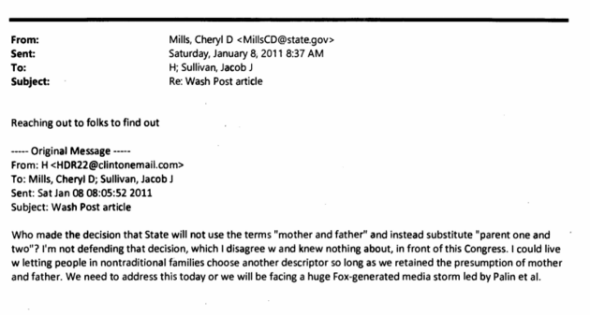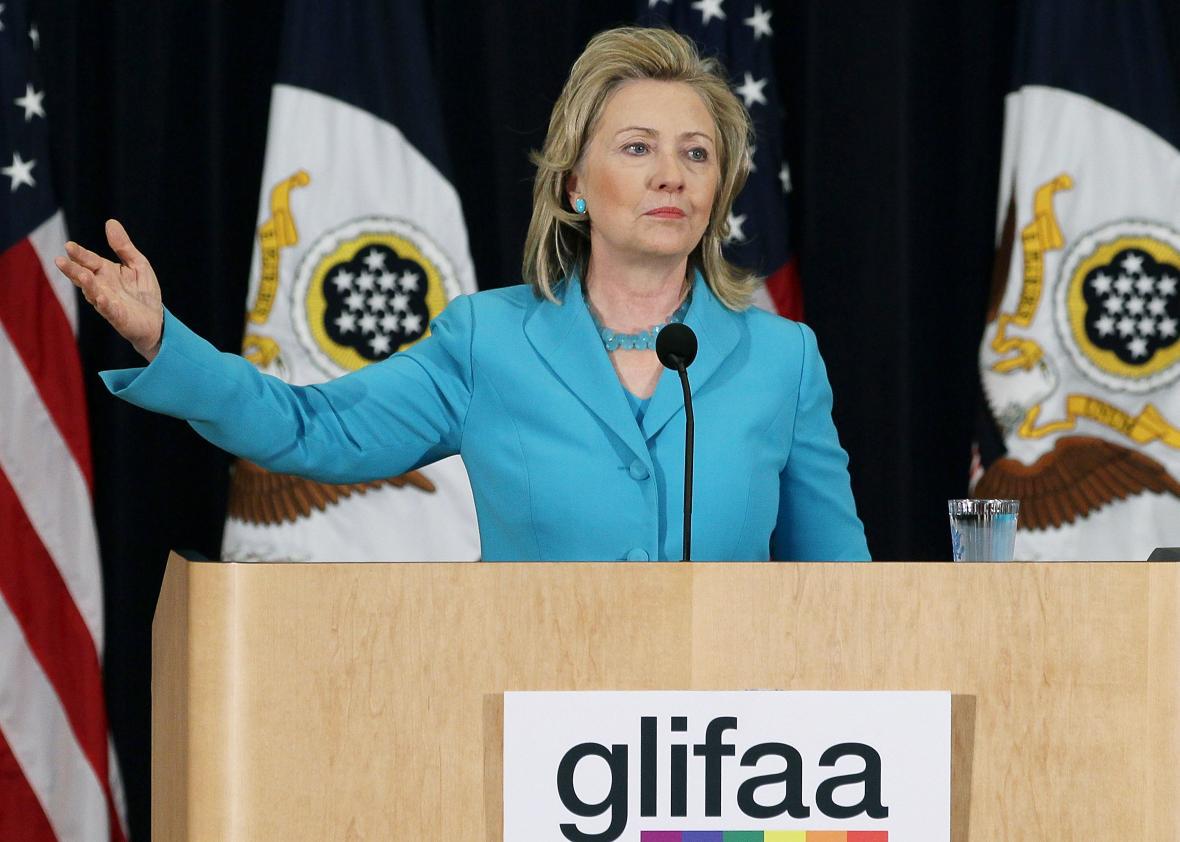In late 2010, the State Department made an exceedingly innocuous change to U.S. passport application forms. Instead of listing “Mother” and “Father,” these forms would now list “Parent 1” and “Parent 2.” The change, the department declared, was “in recognition of different types of families”—namely, families with same-sex parents.
Then-Secretary of State Hillary Clinton was furious. In a recently released email, Clinton proclaimed that she would not defend the decision, “which I disagree w and knew nothing about, in front of this Congress.” She then wrote that she “could live w letting people in nontraditional families choose another descriptor so long as we retained the presumption of mother and father.” Failure to act immediately, she fretted, would lead to “a huge Fox-generated media storm led by Palin et al.” (The department quickly reversed the decision, apparently appeasing the secretary.)

State Department
It’s easy to sympathize with Clinton’s concern about a conservative media maelstrom and insist that, at most, Clinton displayed cowardice, not animus. Four years ago, defending LGBT rights was still a somewhat risky proposition; even President Barack Obama was still too timorous to say that gay Americans should be afforded their constitutional right to marry. But if Clinton was only nervous about political blowback, her choice of words is curious. Why note that she “disagree[d]” with the decision? Why say—hesitantly, almost begrudgingly—that she “could live” with letting gay parents use a gender-neutral form?
Clinton’s decidedly non-inclusive language might be forgivable if she had a sterling track record on LGBT rights. She doesn’t. Clinton only came out for marriage equality in 2013, in what the Economist dubbed a “farcically late conversion.” Even then, she seemed to endorse the Dick Cheney position that states should be allowed to decide whether or not to deprive gay people of their fundamental right to wed. A painful interview with NPR’s Terry Gross only aggravated matters, as Clinton tried to claim that a federal gay marriage ban somehow granted states the right to recognize same-sex unions. (The act, signed into law by her husband, actually impeded states’ efforts to legalize gay marriage, which the Supreme Court recognized when striking it down.)
Since then, Clinton has polished her LGBT message—but not to everyone’s satisfaction. Many of her gay donors are frustrated with her perceived lack of enthusiasm about LGBT rights. She supported the Supreme Court’s marriage equality ruling—but declined to explain why she suddenly believes marriage is a constitutional right and not an issue for the states. In July, Clinton endorsed the federal Equality Act, a sweeping LGBT nondiscrimination law. But then, in September, the Washington Free Beacon published a damning story alleging that, in 2000, then-President Bill Clinton questioned his wife’s commitment to gay rights. (Hillary, Bill reportedly told the historian Taylor Branch, found gay rights “harder to swallow” and experienced “discomfort” around “gay people who were kind of acting out.”)
What’s bizarre about Clinton’s checkered history with LGBT rights is that, as I’ve written before, she really should be a gay rights icon. Clinton is the frontrunner in a Democratic primary in which the vast majority of voters will passionately favor LGBT rights. She’s not responsible for her husband’s gay marriage missteps—and even if she were, she could simply express regret about them and move on. The same goes for her ostensible discomfort around gay people in 2000: Clinton could easily apologize for her erstwhile narrow-mindedness. Over the last few years, in fact, most of her Democratic colleagues have done exactly that. Why is Clinton still unwilling to confess past error and get in front of the issue?
The conventional wisdom is that, when it comes to gay rights, there are two Hillary Clintons: Clinton the politician, a cautious moderate, and Clinton the person, who of course supports civil rights for gays. I’m not quite sure that dichotomy holds up to scrutiny. It was, after all, Clinton the person who wrote that she “disagree[d]” with a tiny paperwork revision to accommodate same-sex parents. And it was Clinton the politician who told the United Nations that “gay rights are human rights” in 2011—shortly before the passport kerfuffle.
I don’t doubt that Clinton now earnestly believes in the LGBT cause. But I do suspect that hers was a more recent conversion than she’d like to admit. That’s fine: Plenty of good people, including politicians, were blind to the urgency of the issue until this decade. But Clinton should acknowledge her previous misgivings and fervently affirm her allegiances going forward. Her donors and supporters have been quietly pushing for a more honest and vehement stance all summer. Clinton—both the person and the politician—would do well to listen.
